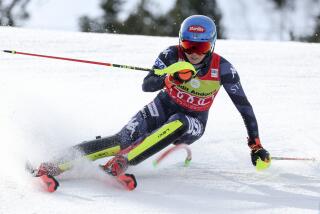World Alpine Ski Championships : A Switzerland Parade: Walliser and Figini 1-2 in Women’s Downhill
- Share via
CRANS-MONTANA, Switzerland — If for some reason you want to get away from other Americans for a while, this is the place to be. There aren’t many on either the slopes or the streets here in the Valais, nor are there many in the official results of the World Alpine Ski Championships.
At least, so far.
It’s no longer the fear of terrorism that is keeping U.S. tourists and skiers away. It’s more like the fear of the franc.
In the case of the U.S. Ski Team, it is the 150 Swiss francs ($100) being charged per night, per bed, to house its racers for this event, which continues through next Sunday.
Tourists can stay away, but the ski team can’t--not from a competition that ranks below only the Winter Olympics in importance. Then again, that might not have been such a bad idea. We’ll know more after the women’s giant slalom and slalom on Thursday and Saturday, respectively. As for the chances of the American men in their remaining races, forget it.
Sunday turned out to be another day of triumph for the host nation. More or less as expected, Maria Walliser and Michela Figini finished 1-2 in the women’s downhill, thereby touching off another uproarious celebration by the natives. It came less than 12 hours after a similar orgy of cowbell-ringing and general merriment, caused by a Swiss sweep of the men’s downhill, had subsided.
On another postcard day in the Alps--color it a brilliant blue and dazzling white--the red and yellow racing suits of the Swiss skiers created a series of blurred rainbows at the finish line.
First, it was Figini, 20, the 1984 Olympic champion, who took the lead with a time of 1 minute 44.11 seconds down the 1 1/2-mile course. The cheering and flag-waving was just starting to die when, six racers later, Walliser stopped the blinking lights at 1:43.80 to ignite still more rejoicing. That was the race.
The Swiss let someone else take the bronze, in this case West Germany’s Regine Moesenlechner, who edged teammate Marina Kiehl, 1:44.86 to 1:45.06. Canada’s Laurie Graham was the top North American, placing fifth in 1:45.10.
Asked why the Swiss have become so dominant in ski racing, Walliser, 23, the defending World Cup champion and current leader on the circuit, said: “There are a lot of reasons. The organization is good, and it is possible to have individual training within the program, because the trainers know us and work with us as individuals. Also, the coaching and methods are the same from year to year, and this continuity gives us confidence. We always know where we are going.”
Peter Mueller, who won the 2-mile men’s downhill Saturday, had offered this explanation: “We have so many good racers that the competition just to make the Swiss team is very intense, and we have to train very hard all the time. Sometimes, it is more difficult than the actual races.”
The thin blue line of Americans again finished out of the top 10, as Debbie Armstrong, the 1984 Olympic giant slalom gold medalist was 13th, and Pam Ann Fletcher, considered the No. 1 U.S. downhiller, was 19th.
Austria’s women proved to be no better than its men in the downhill, settling for a sixth place by Sylvia Eder, meaning another morning of black borders on the front pages of Vienna newspapers.
For the Swiss, on the other hand, it was a perfect weekend, although there was a minor setback Sunday afternoon.
The improved weather enabled organizers to run off the postponed downhill race in the men’s combined, and Pirmin Zurbriggen, who won the combined gold medal at Bormio, Italy, in 1985, finished first. However, Marc Girardelli of Luxembourg placed third and won the combined title because he had a greater time differential over Zurbriggen in the slalom last Tuesday, when they were seventh and ninth, respectively.
Guenther Mader of Austria took the bronze, while the top American was Felix McGrath in 13th place.
So, all the men’s combined really did was underscore the fact that Girardelli, the two-time defending World Cup champion, and Zurbriggen, who won the Cup in 1984 and currently tops the overall standings by a wide margin, are both excellent all-around skiers, in the mold of Jean-Claude Killy and Toni Sailer.
For Girardelli, 23, the outcome was especially satisfying. He has been plagued all winter by a troublesome left shoulder, which he first injured at Sestriere, Italy, in December.
“When I hurt it again at Kranjska Gora (in Yugoslavia), I thought my season was over for good,” Girardelli said. “But then I sent for a masseur who had been recommended to me in Austria. He is an Egyptian named Mohammed Khalifa, and after he had worked on me for only two days, I was skiing again. My shoulder did well, even though I didn’t.
“I had a good result at Adelboden (in West Germany), but then it felt bad again after Wengen (in Switzerland, site of the Lauberhorn in mid-January). So, I sent for Khalifa again. Today, I felt absolutely no pain. I’m fine, and it is good to be winning again.”
Girardelli and Zurbriggen will renew their rivalry today in the men’s super-G, a relatively new race that is longer than a giant slalom but shorter than a downhill.
And somewhere in Salzburg, an Egyptian masseur is doubtless waiting by the telephone with an airplane ticket to Geneva in his pocket, just in case.


